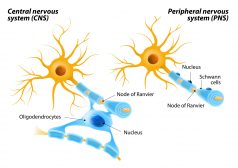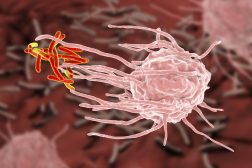Foliation
1. The process of forming into a leaf or leaves.
2. The manner in which the young leaves are dispoed within the bud. The . . . Foliation must be in relation to the stem. (De Quincey)
3. The act of beating a metal into a thin plate, leaf, foil, or lamina.
4. The act of coating with an amalgam of tin foil and quicksilver, as in making looking-glasses.
5. The enrichment of an opening by means of foils, arranged in trefoils, quatrefoils, etc.; also, one of the ornaments. See Tracery.
6. (Science: geology) The property, possessed by some crystalline rocks, of dividing into plates or slabs, which is due to the cleavage structure of one of the constituents, as mica or hornblende. It may sometimes include slaty structure or cleavage, though the latter is usually independent of any mineral constituent, and transverse to the bedding, it having been produced by pressure.
Origin: cf. F. Foliation.
Dictionary > Foliation
You will also like...

The Central Nervous System
Myelin sheath is essential for a faster conductivity of signals. Know more about this feature of some neurons in the Cen..

Birth Control and Contraception
Different pregnancy and birth control and contraception strategies are described. Read this tutorial to learn each of th..

Digestion and Absorption of Food
The gastrointestinal system breaks down particles of ingested food into molecular forms by enzymes through digestion and..

Biological Cell Defense
Organisms employ different strategies to boost its defenses against antigens. Humans have an immune system to combat pat..

Growth Patterns
This tutorial describes the sigmoid curve, annual plant growth, tree growth, human growth, and insect growth as the grow..

Population Regulation in an Ecosystem
With regard to the population size of a species and what factors may affect them, two factors have been defined. They ar..

